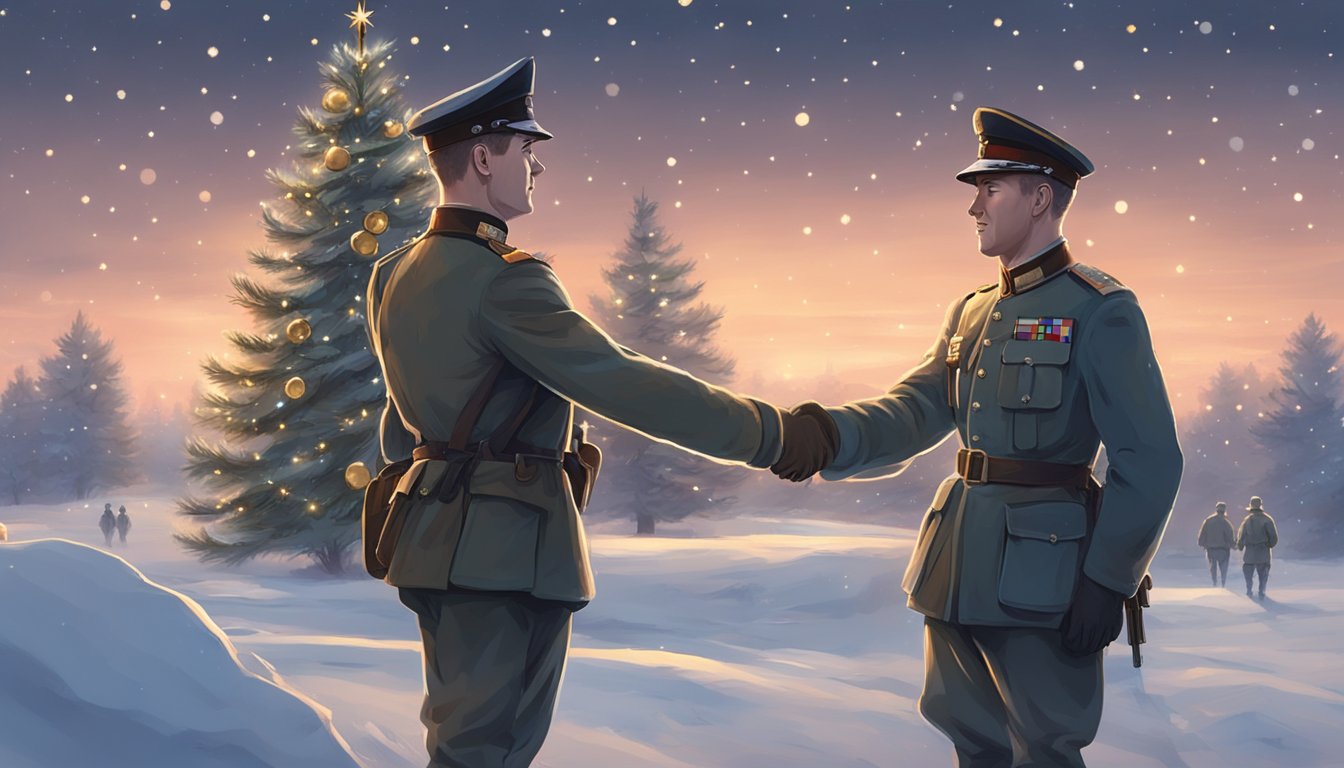As December 1914 drew to a close, the Great War had already ravaged Europe for nearly five months.
The initial excitement that the conflict might end by Christmas faded, replaced by the grim reality of a protracted struggle.
The might of the German military quickly became apparent, and amidst a lack of success for the Allies, many soldiers began to harbor a reluctant respect for the men battling against them in the muddy trenches of no man’s land.
Conditions on the Front Line
Conditions were dire for both sides, marked by relentless weather and the stark challenges of trench life.
The staggering reports of wartime brutality had settled into a painful routine, as soldiers became painfully aware of the devastating power of new weaponry and artillery.
The horrors of war had become their daily reality, forcing them to adapt to the perpetual dangers of their environment while remaining vigilantly alert to avoid life-threatening mistakes.
Despite being locked in a stalemate, fragments of informal truces began to emerge along the front lines.
Notably, many German soldiers conversed in English or had lived in Britain prior to the war, fostering a unique camaraderie that offered a glimmer of humanity amid chaos.
Moments of reprieve highlighted by shared meals and friendly exchanges brought about a temporary lull in hostilities.
The Unfolding of the Truce
This growing intermingling did not go unnoticed by military leaders.
General Sir Horace Smith-Dorrien, who commanded the British Expeditionary Force’s II Corps, sought to reestablish a stringent combat posture, chiding his troops for what he perceived as a tendency to adopt a “live and let live” mentality—a phenomenon not uncommon among soldiers in close quarters.
On Christmas Eve, as a biting chill permeated the air and snow began to fall, the reality of wartime longing deepened.
Soldiers on both sides received letters and care packages from home, intensifying their yearning for peace.
Leutnant Walther Stennes of the German army recounted how, as gunfire diminished, troops shifted their focus to their correspondence, marking the day as a poignant moment in the midst of conflict.
That evening, a beautiful surprise unfolded.
Men in the British trenches were drawn to a soft melody wafting from the German side.
They soon recognized it as a familiar English Christmas tune, stirring an unexpected moment of celebration and causing hearty applause to erupt from the British lines.
Interestingly, many of the traditions celebrated during the holiday season—like Christmas trees and decorative lights—had their origins in German customs, introduced to Britain during the Victorian era.
This shared cultural heritage seemingly bridged the divide between the two armies, leading some soldiers to leave the safety of their trenches and approach their foes with cautious greetings and small gifts, mingled with an equally present awareness of past hostilities.
A Fleeting Moment of Humanity
Sergeant Frederick Brown noted the reluctance of some troops to venture too close, but the atmosphere encouraged a few brave souls to make contact.
Accounts from various soldiers depicted scenes of camaraderie and connection, despite the looming threat of sniper fire.
There were moments where conversations flourished, though not without peril; a sergeant’s attempt to greet a German soldier ended in tragedy, underscoring the precarious balance between friendliness and danger.
Amidst this spontaneous truce, soldiers from both lines tested the waters.
Some even engaged in a friendly game of soccer, as recounted by a German officer who recalled kicking around a ball with Scottish soldiers, albeit not everyone felt inclined to join in.
However, many battalions remained resistant to such displays of goodwill.
Troops facing more aggressive German contingents, like those from the 1st Hertfordshire Regiment, opted to stick to military protocol, opting for a meager Christmas meal instead of revelry.
The truce, driven by the soldiers themselves rather than formal military directives, unfolded organically.
Yet, this fleeting moment of humanity was soon overshadowed by the cruel reality of war.
By the end of December, troops returned to their routine of trench warfare, fully aware that the specter of conflict loomed ominously.
The duration of the cease-fire varied significantly depending on the location; some areas enjoyed extended periods of peace, while in others, combat resumed almost immediately.
Once the dust of camaraderie settled, soldiers reentered their roles, ordered to resume their duty and confront their supposed enemies once again.
In the end, the Christmas Truce did not herald a profound moral awakening nor a significant shift in attitudes.
It served instead as a brief oasis amid the relentless horrors of war, offering soldiers a precious interlude where human connection thrived for a moment.
Though many shared in fleeting moments of warmth and goodwill, the bitter realities of battle remained unchanged, with the threat of German aggression still ever-present and no notable shift in the violence that defined their lives.
Peter Hart is an esteemed oral historian at the Imperial War Museum London.
He has penned several influential works, including The Great War (2013), Gallipoli (2011), The Somme: The Darkest Hour on the Western Front (2009), and 1918: A Very British Victory (2008).
Source: Militarytimes

